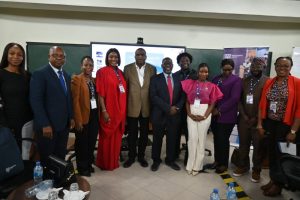Pan-Atlantic University (PAU) held the second edition of its annual Media Roundtable event, centred around the theme: “Beyond Critique: The Importance of Constructive Media Engagement in Governance and Nation-Building.” The event brought together prominent media leaders, practitioners, students, academics, and various media stakeholders.

In his welcome address, Dr Peter Bamkole, the Deputy Vice-Chancellor (Admin) of Pan-Atlantic University, set the tone for the day’s conversations by emphasising the power of truthful and transparent reporting.
“What you see, say, and write must be truthful, transparent, and reliable. Speaking the truth will change the narrative and promote constructive engagement instead of blind criticism,” Dr Bamkole stated.
The event featured an engaging panel discussion led by esteemed media professionals, including Magnus Onyibe (Public Policy Analyst and Author), Fisayo Soyombo (Founder, Foundation for Investigative Journalism -FIJ), Sherriff Quadry (Broadcast Journalist, Nigeria Info), Margaret Agada-Mba (Lecturer, School of Media and Communication, Pan-Atlantic University), Jonathan James Lyamgohn (Media Consultant) and Tolulope Adeleru-Balogun (Head of Programmes, News Central) each offering unique insights into the vital role of the media in governance and society.
Onyinyechi Aderibigbe of Nigeria Info and Elizabeth Musa of Business Day were the moderators at the event.
During the panel discussion, Sherriff Quadry emphasised the demanding nature of journalism, stating that it requires more than simply identifying as a journalist. He highlighted the need for extra commitment, dedication, and above all, sacrifice.
Quadry also stressed the essential role of a free press in maintaining a functioning democracy, noting that democracy cannot survive without journalists, and without a free press, it becomes impossible. He further addressed the challenges faced by Nigerian journalists, asserting that determination is key, as the work can be frustrating, particularly in a context where politicians often feel they should not be questioned.
Quadry also spoke on the responsibility of journalists to ensure that their work positively impacts society, cautioning that reports should foster development rather than create chaos. In her contribution, Margaret Agada-Mba questioned the government’s view of the media, posing the critical question: while the media strives to partner with the government, does the government consider the media a partner in national development?
Tolulope Adeleru-Balogun echoed the sentiment that there should be no restraints on the press, arguing that while cultural, religious, and ethnic sensitivities exist, they should not translate into restrictions on media freedom. She further underscored the role of journalists as truth-tellers, stating that their responsibility is to present news with honesty and transparency.
She further added to the dialogue by stressing the responsibility of senior journalists to mentor the next generation.
“There has to be a space for the transference of the values that make journalism what it is,” she said, underscoring the importance of cultivating ethical values in upcoming journalists.
Magnus Onyibe added that if journalists are ever offered the opportunity to work with the government, they should ensure they do so with a clear conscience, maintaining their integrity in the face of such challenges.
Fisayo Soyonbo addressed the issue of harassment faced by investigative journalists, highlighting that the solution to such intimidation is more investigative journalism.
“The answer to harassment is more journalism because the idea of harassment is to get the journalist to stop pursuing the truth,” Soyonbo said.
He emphasised the journalist’s role in uncovering the truth and presenting it to the public: “The job of a journalist is to dig the truth and release it.”
Jonathan James Lyamgohn emphasised three key principles when engaging with the government: respect, patriotism, and press independence.
“We are the fourth estate of the realm,” he noted, underscoring the vital role of journalists in upholding democracy.
He also remarked, “Journalism will always be challenging, but journalism will always be rewarding. Our ultimate employer, beyond our organization, is the people.”
The panellists reiterated that journalism is not merely a profession but a commitment to truth, transparency, and societal impact. As media practitioners navigate the complexities of reporting in a challenging environment, they must remain steadfast in their duty to hold power accountable, foster positive change, and contribute to the growth of a more informed and engaged society.
The event called on both the media and government to foster a relationship grounded in mutual respect and the shared goal of national development while preserving the integrity of a free and independent press. Through constructive engagement and responsible journalism, the media can continue to play a pivotal role in ensuring accountability and promoting the common good.
